Peter MALONE
Saturday, 18 September 2021 20:01
Spy Kids 3D: Game Over

SPY KIDS 3D: GAME OVER
US, 2003, US, 2003, 84 minutes, Colour.
Antonio Banderas, Carla Gugino, Alexs Pena Vega, Daryl Sabara, Ricardo Montalban, Holland Taylor, Sylvester Stallone, Mike Judge, Selma Hayek, Matt O' Leary, Emily Osment, Cheech Marin Danny Trejo, Alan Cumming, Tony Shalhoub, Steve Buscemi, Bill Paxton, George Clooney, Elijah Wood, Selena Gomez.
Directed by Robert Rodriguez.
The unexpected success of Spy Kids meant that a sequel was inevitable. It followed very quickly. This next sequel has also followed very quickly but it has an added gimmick: 3D. Because audiences have to wear special glasses, they have found it annoying or irritating. Director Robert Rodriguez has been shrewd in this regard and has actor Alan Cumming explaining to the audience at the beginning of the film when to wear them and when to take them off - and a sign comes on to the screen just in case we didn't realise. By drawing attention to the glasses and their effect, he has made us happier to wear them.
The centre of the story this time is Juni, played by Daryl Sabara. Having retired from spy activities, he is called back into action to combat the arch-villain, The Toymaker, who has invented a computer game that is unbeatable, Game Over. Juni's sister, Carmen, is now trapped in the game and Juni has to rescue her and defeat the Toymaster. The 3D effect is for watching the computer game.
On paper, it must have seemed a wonderful idea to have Sylvester Stallone as The Toymaster, to make him a villain and a comic at the same time. He may get away with it with young audiences, but his performance (along with characters based on other parts of his personality) seems very awkwardly less than funny. Much more effective is Ricardo Montalban who has a big role as Grandpa, the previous colleague of The Toymaker and then his victim. Juni is assisted along the way by a group of kids who enjoy their opportunity to be inside the computer game. Better still is that everyone from the previous movies is called in to help: parents, grandparents, friends, which makes it a happy reunion of all who worked on the series.
1. The popularity of the first two films? Espionage? Kids involved? Adult professionals? The move into computer games and action in virtual reality?
2. Home, the children, the cameo of the parents, being looked after by the grandparents, the benign grandfather and his help?
3. Virtual reality, 3D, the details of the game, the various levels, the difficulties and hazards, the conflicts, the fights? Fegan Floop explaining to the audience about putting glasses on and taking them off?
4. The Toymaker, Sylvester Stallone, former agent, multiple personalities, villain, power hungry, trapped in the game, Juni having to enter the game,not a spy but in private practice, the president’s call, going to OSS, the bosses, using his wits, his grandfather’s help, searching for his sister, confrontation with the Toymaker, the different agents within the game, the dangers, shot to the moon, the lava surf?
5. Juni and Carmen, known from the first two films, growing up? Relationship with their parents and the discovery that were spies? The care of the grandparents? Carmen, older, playing the game, becoming trapped, needing rescue?
6. The range of stars, the cameo appearances adding to the enjoyment of the film? The happy reunion al all at the end – including the Toymaker?
7. The target audience, children and age range, the response to the characters, the nature of the computer games, the invitation of virtual reality, identifying with Juni and Carmen?
Published in Movie Reviews
Published in
Movie Reviews
Tagged under
Saturday, 18 September 2021 20:01
Snow Flower and the Secret Fan
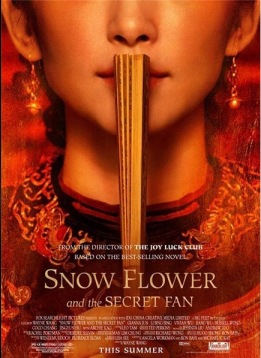
SNOW FLOWER AND THE SECRET FAN
China, 2011, 120 minutes, Colour.
Bingbing Li, Ji-hyun Jun.
Directed by Wayne Wang.
A fascinating visit to China, present and past. Readers of the book by Lisa See have commented that the film focuses on the past and that the film has created the story set in the present. This makes it a different interpretation of the book and highlights the comparisons between the 21st century and the early decades of the 19th century. This is particularly the case in the status and treatment of women. This is very much a woman’s film in focus, themes and performance.
Hong Kong born Wayne Wang has had a very varied career for over twenty five years. Some of his earlier films from the 1980s had Chinese themes (Dim Sum, Eat a Bowl of Tea) some of them in an American setting. After that, he made many films in the US, with very American themes (Smoke, Maid in Manhattan). However, in recent years he has shown a greater interest in Chinese stories.
One of Wang’s best-known film is The Joy Luck Club (1993), the story of four Chinese women, their past in China and their lives in America. Snow Flower can be seen as a companion piece. But, the story remains in China with only verbal references to the US and to Australia.
The film opens in the present in contemporary Shanghai. It should be said that the views of Shanghai throughout the film are very striking. We get a very good look, in close-up, of how Shanghai is a modern and developing city. We are introduced to Nina, a young woman about to open a New York office of her bank. But, she receives news that her close friend, Sophia, is in coma after a bicycle accident.
Flashbacks are introduced to show how the two girls met. Nina coaches the Korean born Sophia in Mandarin. So, we are offered two times as the film moves between the present and the past of the two women, especially the formalising of ‘laotong’, a lifelong contract of friendship between two women.
But, who is Snow Flower?
She is a young child in 1829 who suffers the cruel custom imposed on girl children, foot binding, so that they will have ‘perfect’ feet. She is from a poor background but her companion in the foot binding is a more wealthy girl, Lily. They bond as lifelong friends.
So, this introduces a third time for the narrative. Audiences may need to pay attention as the screenplay moves from period to period. Some may think it is confusing, but the film-makers want to dramatise the parallels between the lives of the women in a patriarchal past where their fate was to be wives and mothers (of boys), oppressed by their husbands, by the laws and customs of tradition, and a much freer life now for women and control of their destinies.
The parallels and contrasts are fascinating and a strong reminder that worlds change (and must). This is reinforced by two actresses playing the adult Snow Flower and Lily and also Nina and Sophia.
As the drama in each period unfolds, issues of love, self-sacrifice and discovery of the depths of affection, love and commitment are beautifully explored.
Bingbing Li is Nina/Lily who is single-minded for success but self-sacrificing (and controlling) for her friend. Gianna Jun is gentle and loving as Snow Flower and wilful as Sophia. Towards the end of the film, Hugh Jackman appears as Sophia’s lover.
This is a film to surrender to rather than to sit in (impatient) judgment. It offers many challenges about history and the present and the rights of women and issues of equality.
1. A Chinese story, 19th century, 20th century, and comparisons between the two with the status of women, relationships, oppression, modern cultural developments?
2. The work of the director, his Chinese background, films made in China, themes about Chinese topics, and in the US?
3. Title, the focus on the secrets, flowers, the messages, communication? The beauty and mysteriousness of the fan and its folds, the messages? In both stories?
4. The performances of the actresses, in both stories, comparisons and contrasts?
5. Women, in China, the 19th century, Snow Flower and Lily, the two with different status, oppression, marriages, inferior status, the binding of the feet and physical and psychological consequences? Love, the bonding between the women, friendship, support, the effect, life-giving?
6. The 20th-century, the two women, challenging perspective, Nina in business and banking, severe, the accident, coma, her lover, wilfulness? modernity, the look of the Chinese cities, the lifestyle, the post-Communist period? Friendship, relationships, highs and lows? Australian connection? Hugh Jackman and his cameo appearance?
7. The similarities between periods? The differences? The highlighting of the differences in culture in 100 years?
8. The importance of the stories as women’s stories, the contribution to the better status of women?
Published in Movie Reviews
Published in
Movie Reviews
Tagged under
Saturday, 18 September 2021 20:01
Chage-up, The
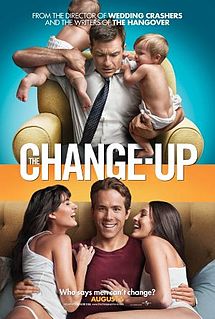
THE CHANGE-UP
US, 2011, 118 minutes, uncut, 112 minutes, cut, Colour.
Ryan Reynolds, Jason Bateman, Leslie Madden, Olivia Wilde, Alan Arkin.
Directed by David Dobkin.
With the advertising tagline, ‘From the director of The Wedding Crashers and the writers of The Hangover’, one would think that more than enough consumer information was offered for discerning filmgoers. The tagline is not false advertising.
For a while, over several decades, there was a series of comedies where two characters took each other’s personality while still looking their original selves. These tended to be father-son changes (Like Father, Like Son or Vice Versa) or mother-daughter changes (Freaky Friday). This time it is two middle aged men. One is a very successful married lawyer with children (Jason Bateman doing his now familiar thing as the put-upon businessman) and the other is an irresponsible womanising loser (Ryan Reynolds doing what he used to do in crass comedies like Waiting, Buying the Cow or Van Wilder, Party Liaison).
We know where we stand (or where we sit). There are lots of situations which we might have thought up had we been asked to write a screenplay. The loser has to become responsible (not very good at it at all, goofing in the office and cavalier with feeding crying babies during the night...). Ryan Reynolds is a good enough actor to be able to do both incarnations of his character. Not so sure about Jason Bateman being let loose (and he is tempted to become quite loose at times). Even acting irresponsibly, he is not quite credible or persuasive.
There are some funny sequences as you might imagine (and Alan Arkin turns up as the loser’s father). I am indebted to reviewer Tom Ryan of The Sunday Age for providing me with an adjective for this review and for future use. There certainly are some crass moments and jokes, but a lot of it is more basic, bodily functions and pooping babies etc. The word for this kind of humour and treatment is ‘tacky’.
It’s an American comedy of middle age and, as usual, with Judd Apatow comedies and the like, there is traditional moralising at the end. (And Jason Bateman’s wife is actually played by Leslie Mann who is the real Mrs Apatow.)
1. American-style raucous comedy? A serious underlying point about the possibilities for looking at selves and changing perspective? Changing?
2. The American city, families, business, offices, clubs? The musical score?
3. The popularity of films where characters interchange interiorly but keep the same externals? The title?
4. The establishing of the two characters, Ryan Reynolds and Jason Bateman and their careers and comic styles? David, lawyer, wife and children, a more serious type? The contrast with Mitch, actor, freewheeling, womaniser?
5. The situation, out together, drinking, urinating, envious of each other’s lifestyle, wishful thinking the transformation? The results? The serious character in a more promiscuous situation? The loose character in a more serious situation and relationships? Responsibility and irresponsibility? And their searching for the fountain so that they can change again, its being removed, the search – but the final wake up and back to themselves? Different selves?
6. Dave, in Mitch’s situation, expectations of him? Taking the day off, the aquarium, watching the movie, the risk of compromising situations? Dave trying to tell his wife in the truth but her not believing? Mitch in Dave’s situation, at home, gradually taking responsibility for the children, Dave’s wife, talking with his father and getting advice, his bungling things at the office with the deals, but interested in Sabrina, the date, Dave’s advice?
7. Dave, his being made a partner, the celebrations, Mitch present, Mitch upset about not being invited to the anniversary party and learning that Dave thought he was too wild?
8. Sabrina, at work, the crush on Dave, the encounters with Mitch?
9. Dave, his wife, devotion, the children?
10. Each waking up, back to themselves? What had each of them learnt about themselves, about each other, an approach to life, and approach to responsibility?
Published in Movie Reviews
Published in
Movie Reviews
Tagged under
Saturday, 18 September 2021 20:01
Wide Open Sky
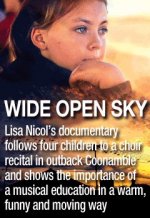
WIDE OPEN SKY
Australia, 2015, 87 minutes, Colour.
Michelle Leonard.
Directed by Lisa Nicol.
Most audiences should enjoy Wide Open Sky very very much, even if they are not so strongly into music, song and choirs. The personalities of those involved and of the children will certainly win them over.
This is a story about singing, about children singing, about a choir in north-western New South Wales. The energy behind the program is from a singing teacher and conductor, Michelle Leonard, who hailed from Coonamble and now has returned to these country towns with her project, the Moorambilla Voices. She is an engaging personality, a touch larger than life, able to communicate with the children particularly well.
Every autumn she goes round to the towns, visits schools, especially the primary schools, asking the children to sing, listening attentively to their voices, their pitch and their accuracy in notes. She chooses over 150 and they all go to a camp in the town of Baradine for three days, bonding, rehearsing, getting ready for a concert which takes place in Coonamble. While a lot of the film is taken up with the rehearsals, the boys’ part of the choir, the girls’ part of the choir, learning the songs, the words and the music, there are also scenes of children at play, the different kinds of bonding between the girls and the boys amongst themselves.
Six children have been singled out for particular attention in the film. It is the two boys who make the most impression. For one, Mack, it is a kind of Billy Elliot story, not interested in football so much but wanting to sing and certainly a talent for dance and movement. He is confident in speaking to camera, in singing solos, and is supported by his parents who did try to get him interested in football but now foster his music ability. The other boy is a little boy, with some aboriginal background, who loves playing football, is short in stature, a touch of the cheeky, and certainly anxious to succeed in singing. One of the girls is certainly more assertive, wanting to be an actress, good at singing, but at times self-conscious, something she calls “shame”. There are three other girls, one talented singer was interested in medicine, and two girls who are interviewed together and bounce energetically off each other.
We also see the associate staff, the young choir assistant as a composer, a driver, the camp manager, youth workers, especially young man who has come up through the ranks and come out of himself, and the cooks and kitchen staff.
Children appreciate affirmation, recognition of their abilities, of who they are, the development of talents that they may not have realised – and this is what Michelle Leonard does with these children, over 20oo in ten years, and watching her and the children leads to the words like inspiring, encouraging, – and even exhilarating.
1. Acclaim for the film? The popularity with audiences?
2. The title, the countryside, the song?
3. Audience interest in music, song, choirs, children?
4. A film of affirmation, justice for young children, who are poor, those in need, possibilities for the future, talent, transformation, the children and their parents, the children and their peers, performance, achievement?
5. The location photography, the open road and countryside, the towns of north-western New South Wales, homes, main streets, shops, pubs, the schools, football fields?
6. The focus on Michelle Leonard, her background in Coonamble, help when she was a girl, her love of music, leaving the town, the training, the idea of the choir, and the ten years of success, the range of staff she employed, love for music, the composers, the managers, the youth workers, cooks?
7. Her personality, seen at the auditions, hearing the pitvh of the voices, the choice of the children, her ability in communication and putting the children at ease, at the camp, the choir sessions, the songs, the training and her schools, with each of the children, affirmation and sensitivity?
8. The range of children, the number, from all kinds of backgrounds, aboriginal backgrounds? The children, Mack, his parents, the Billy Elliot story and his dancing shoes at the theatre performance, not into football, his dancing, his schoolfriends, his singing? The scenes of his dancing – like an audition? The small boy, aboriginal background, dance, the football, talking, his friends? Going to Knox Grammar and the scholarship, the suit? The young girl, on her bike, wanting to be an actress, singing, her talking about shame, her enjoyment of the camp? The girl who was able to sing, her family, in the bush, interest in being a vet, medicine? The two girls, friends, easy-going, bouncing off each other?
9. The portrait of the assistants, the driver, the choir assistant, composer, the manager, the kitchen staff, the young man and his development through the choir and his being employed ,interactions with the boys and girls?
10. The rehearsals, the enjoyment of the camp, the bonding? The return for the concert, the uniforms, walking in, the audience, the performance, the Sydney Orchestra, the drums, a gala occasion?
11. The glimpses of the children, the Australian background, from the Australian country, opportunities, parent support? Future?
Published in Movie Reviews
Published in
Movie Reviews
Tagged under
Saturday, 18 September 2021 20:01
Don't Go Near the Water

DON'T GO NEAR THE WATER
US, 97, 107 minutes, Colour.
Glenn Ford, Gia Scala, Earl Holliman, Anne Francis, Keenan Wynn, Fred Clark, Eva Gabor, Russ Tamblyn, Jeff Richards, Mickey Shaughnessy, Mary Wickes, Jack Albertson.
Directed by Charles Walters.
Don’t Go Near the Water was a very popular film from 1957, given the MGM elaborate touch, with director Charles Waters, noted for so many musicals during the 1950s. It received Golden Globe nominations for the film and for Glenn Ford.
The screenplay is from a novel by William Brinkley, a memoir, but written by Dorothy Kingsley – interesting in its presentation of men gawping at women, seemingly very chauvinist for the time – but, raising the very interesting question at the end of the film as to whether the woman followed the man to his job or the man followed the woman to hers. In this one, he follows her.
Another interesting thing is that Mickey Shaughnessy plays a very rough and ready recruit who is chosen to be the figurehead for Navy public relations – but has a habit of swearing, with a buzz bleeping out every time he swears (frequently); and one wonders what the film makers had in mind for the word back in 1957!.There is an amusing supporting cast, Keenan Wynn doing his thing as the bumptious journalist, Eva Gabor as a glamorous journalist, Mary Wickes as a comic foil working at the desk, Anne Francis and Gia Scala providing beauty and glamour, Russ Tamblyn is a cheeky young ensign, Jeff Richards as a smart officer – but Fred Clark doing a variation on his usual performance but enjoying it as the sometimes slow-witted commander.
There were many films at this time in the same vein including Glenn Ford in Teahouse of the August Moon or Mr Roberts.
1. A popular film of 1957? Humorous recollections of World War II in the Pacific?
2. The Pacific Island, Navy headquarters, the village, the school? Inserted actions of warfare at sea? The musical score? The title song?
3. The strong cast, character actors at MGM at this time?
4. Memoirs of World War II, the humorous aspects? This film as an example of satire and parody?
5. The group on the island, public relations, the commander and his eccentricities, past work in accountancy, with the sextant – even getting it wrong, his slogans – Think Big, his relationship with the men, orders, the rules? His concern about image and public relationship, journalists? Fraternising? His being advised by his men, Siegel and his advice? The building of the officers club and the farcical comedy? The end and the announcement that the club would be available for everyone on the island?
6. The range of men, their jobs, public relations? Siegel in charge? His personality? Showing around the Congressmen, their bumptiousness, attracted to the teacher? His work with Adam Garratt, dating Alice, a pleasant go-between? The issue of the journalist, his presumptions, his laundry, the thousand dollar bill – and the bright idea of setting him up, the date, recording him, blackmail and his handing over the money? But his happily taking credit at the dedication of the school? The arrival of the journalist, attractive, on board with her, the Admiral? His falling in love with the teacher, the meetings, researching the questions, the gift of the Encyclopaedia Britannica, meeting her father, and admiring the chess pieces, the chess game, his disappointment at her involvement with the journalist? The announcement, the proposal? The important discussion about her moving to America or his staying? And the interesting solution in his staying?
7. The journalist, bumptious, his boss, puritanical, his articles, pressure for information, getting his laundry done, the thousand dollar note, wanting a date, Siegel deceiving him, the recording, handing over the money, the dedication of the school?
8. The other officers, working for the commander, his nickname, Ross, dates with Alice, Miss Aldrich talking about his wife? The ensign, young and cheeky, the laundry?
9. The teacher, attractive, with the children, the prim traditions of the island, her father, meeting with Siegel, the gift, the building of the school, her father and his education, chess, the proposal, the discussion about staying or going?
10. The recruit for PR, rough, tattoos, language and bleeps, his speech and the applause?
11. Mary Wickes and her comic touches as Jane at the office, and the Scotsman at the end with her?
12. Cheerful comedy – but firmly anchored in the past?
Published in Movie Reviews
Published in
Movie Reviews
Tagged under
Saturday, 18 September 2021 20:01
Ladygrey

LADYGREY
South Africa/ Belgium, 2015, 109 minutes, Colour.
Peter Sarsgaard, Jeremie Renier, Emily Mortimer, Claude Rich, Liam Cunningham, Jude Foley, Sibo Miambo.
Directed by Alain Choquat.
Ladygrey is a collaboration between Belgium and South Africa.
Ladygrey, one word, is the title of the film but it is seen in notices in the town with the two words Lady Grey. It is based on several novels, with many different strands at the interconnecting them.
The setting is the early 21st century, a post-apartheid South Africa, yet still retaining aspects of apartheid, and some tensions in relationships between blacks and whites, especially the Africkaaners and visitors from Europe with the locals.
The photography is very attractive, the town, the countryside, mountains, fine weather, snow, the fields and the crops and the river.
The cast reflects the internationality of the film with Claude Rich and Jeremie Renier coming from France and Belgium, Emily Mortimer and Jude Foley from England, Liam Cunningham frim Ireland, Peter Sarsgaard from the United States. Many locals in supporting roles.
The situation in the town is that there has been a massacre, eleven locals and two overseas nurses including the wife of Peter Sarsgaard, the bodies not having been recovered. There is an atmosphere grief, especially for Sarsgaard and his son, Jude Foley. Liam Cunningham plays landowner Angus, married to Emily Mortimer but having an affair with a local woman. There is Claude Rich, an elderly man dying, with his mentally-impaired son, Jeremy Renier – the film devoting a great deal of attention to him and his love for a symbolic eagle.
The film is a mixture, fine to look at but challenging in bringing all the strands together.
1. An African- European collaboration? Based on several novels, with different strands, combined?
2. The title, the South African town, the town itself, shops, homes, the countryside, the mountains, the snow, the river, the flocks? The crop by the river? The musical score?
3. 21st century post-apartheid? The European presence, Afrikaaners, the British? The story of the massacre?
4. The focus on Angus and his strand of the plot? Owner, the shepherd boy and communication, the sheep and the deaths, the predators? His relationship with his wife? The affair with Estelle? The men, at work, the pay? The touch of the sinister? The men and their discovery of the bones? Olive, her relationship with Angus, strained? Her medical background, her care for Henri, the discussions with Estelle? The attraction to Samuel?
5. Samuel, his story, his marriage, the death of his wife, her nursing and helping, his son, communicating with him, the different languages? The house, surviving, the need for money, his being available for labour, his jobs, going to the store, developing the roses – and seen as weeds? Getting the money, taking his son to dinner, getting drunk, the boy having to eat two deserts? His grief, and the prayers at night with his son?
6. Mattis and his story, Henri and his being aged, sick, his wife, taking the mistress? His love for his son? Claiming Estelle as his daughter? Estelle and her relationship with Angus? Her care for Henri? Tension with Olive? Mattis, simple, the tours for the elderly, the sunglasses, the fake money, looking at the eagle, wanting to buy it, at the store, the discussions with the trainer? Telling the stories to his father?
7. The town and the people, the old lady, their stories, drinking, the bar, the workers, the finding of the bones, the massacre and the attackers, those buried in the river, the funeral celebration, the atmosphere of the church, prayer?
8. Sam’s son and his tunnel through the crops to the river, the dog, showing it to Mattis?
9. The symbolism of the eagle? Prey, soaring, Mattis and his love of the eagle?
10. The glimpse of these people, their futures?
Published in Movie Reviews
Published in
Movie Reviews
Tagged under
Saturday, 18 September 2021 20:01
Man of the Year, The/ O Homem do ano
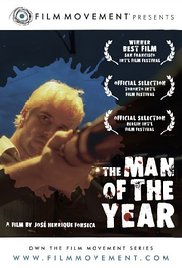
THE MAN OF THE YEAR/ O HOMEM DO ANO
Brazil, 2002, 104 minutes, Colour.
Murilo Benicio, Claudia Abreu.
Directed by Jose Henrique Fonseca.
During 2002, City of God was a success all around the world. A Brazilian feature, it highlighted life in the barrios of Rio de Janeiro. It took the audiences back to the 60s and 70s, focusing on the young boys who followed their older brothers and fathers into a life of gangs and crime. It was a frightening film, showing young children with an urge to violence, exercising manipulation and shrewdness. With Man of the Year, we are again in Rio de Janeiro. This time we are in the mainstream, not an affluent area, but people who live ordinary lives, own ordinary stores and do ordinary jobs - but connected with some of the wealthy, who want to control the populace with right-wing authoritarian ideas, as well as to corrupt police.
The film tells the story, or the character tells the story himself, of how, after losing a bet, he has his hair dyed blond. This leads to a confrontation in a bar and his vendetta the next day, shooting dead the man who insulted him. Instead of the police coming to arrest him, or giving himself up as he thought he should, he becomes the area hero for having rid the area of an obnoxious criminal. Eventually, he
is asked to do another killing, this multiplies and he becomes a professional killer, aided by his friends who operate a garage remaking cars illegally. He also falls in love with the woman who changed his hair colour, she becomes pregnant, but, according to the pet store owner for whom he works, once married, the excitement falls out of the marriage. He also takes in, at first unwillingly, the young girl who was living with the man that he murdered.
As the film progresses, it becomes more disturbing. The young man gradually assumes the persona of the killer, wanting contracts, getting finance, becoming more and more amoral, if not immoral. However, the ending is not easy and there is an escalation of violence. The film ends with all kinds of possibilities.
Very well acted, realistically shot in Rio, the film is a mixture of serious comment on society in Rio as well as having a great deal of black comedy. In this it is quite unique entertainment.
Published in Movie Reviews
Published in
Movie Reviews
Tagged under
Saturday, 18 September 2021 20:01
In the Name of Buddha
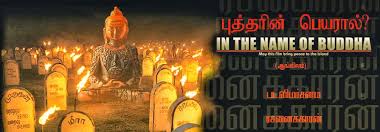
IN THE NAME OF BUDDHA
Sri Lanka, 2002, 147 minutes, Colour.
Directed by Rajesh Touchriver.
We don't have the opportunity to see many (or any) films from Sri Lanka, so In the Name of Buddha is a good opportunity. While the film is made for a local audience and uses many of the dramatic and melodramatic styles that are geared to the sensibilities of audiences from the sub-continent, it is also Western-audience friendly.
On its release in Sri Lanka in early 2003, many Buddhists objected to it and other religious groups (including the Catholic Church) protested in solidarity. It was claimed that the film says that Buddhists were responsible for the long civil war. Looked at from this vantage point, this does not seem to be the point of the film at all. In fact, there is a plea for non-violence with reference to both Buddha and Gandhi.
The film is a vivid presentation of the war with some particularly grim sequences which include torture, shooting battles, bombings, brutal rapes and the destruction of a Catholic church during Mass. The point of view of the film-makers is distinctively Tamil and is highly critical of the Sinhalese military and of the Indian Peacekeeping Force which was ineffectual (with some soldiers indulging in atrocities) during the mid-80s. But it is also critical of many Tamil strategies. The violence over two decades took its toll of thousands of Sri Lankans.
The story focusses on an asylum seeker arriving at Heathrow in 1993 and recounting his story to an immigration official. This makes the film relevant to current discussions about intake of asylum seekers. It visualises the dangers they have lived through, war, families destroyed, life ambitions frustrated, military atrocities. The film is not as polished as products from big-budget studios, but it is earnest, grim, emotionally demanding as well as raising political and social issues.
Published in Movie Reviews
Published in
Movie Reviews
Tagged under
Saturday, 18 September 2021 20:01
Final Girls, The
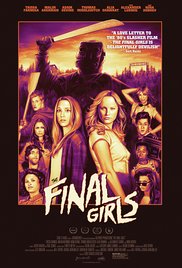
THE FINAL GIRLS
US, 2014, 88 minutes, Colour.
Taissa Farmiga, Malin Akerman, Alexander Ludwig, Nina Dobrev, Alia Shawkat, Thomas Middleditch, Adam De Vine, Angela Trimbur, Chloe Bridges, Tory N.Thompson.
Directed by Todd Strauss- Schulson.
Those who enjoy horror films but, especially, parodies of horror films, will enjoy this one is very much. It has its cake and eats it is well with its various scenes from an alleged 1980s film, Camp Bloodbath, and scenes of 21st-century characters entering into the action of this film – and desperately trying to get out of it.
The film starts with a focus on the mother and daughter, Malin Akerman and Taissa Farmiga (younger sister of Vera Farmiga). The mother is wanting to revive her career having been a star in Camp Bloodbath and remembered for that. Then there is a car accident.
A couple of years later, Max and her friends go to a screening of Camp Bloodbath, Max having to look at her mother again on screen. When a fire breaks out, she and her friends escape through slitting the screen and find themselves in the action of the original film. There is a lot of posturing and posing, permissive talk, reminding audiences of the Friday the 13th series. The contemporary group interact with the actors, especially knowing what was to happen, and trying to escape the killer, a masked killer – with monochrome flashbacks explaining why he was a killer.
The film builds up some suspense but there is always the tongue-in-cheek approach to everything – although the scenes with Max and the character her mother is playing have quite some pathos.
1. 21st century version and parody of 1980s teen bloodbath movies? Having its cake and eating it?
2. The atmosphere of the 21st century, teens and young adults, friendships, family, studies, relationships? The contrast with the youngsters of the 1980s, focus on sex, promiscuity, good times? Duncan and the cruder aspects of the present? Comparisons with Kurt and the others from the film?
3. 2014, average America? The contrast with the camp, behaviour in 1980s? And the flash back to 1957?
4. The background of Camp Bloodbath and its sequel, the sequences, the characters, arriving at the camp, setting up, the individuals, the posing and postures of the time? The role of councillors? The style of performance, the visuals, camera work? Greenie photography? The monochrome flashbacks to the youngsters of 1957, the tormenting of Billy Murphy, the outhouse, the fireworks, hospital and his disfigurement?
5. The debt to Friday the 13th and its many sequels? The masked killer and his motivations? The violence of the deaths – and tone down for the 21st century?
6. Max, her age, love for her mother, sharing together? The mother, starring in Camp Bloodbath, her reputation, auditioning the jobs and failing? Throwing the publicity out of the car window? Bonding with a daughter? The crash and her death?
7. The effect on Max, her character, quiet, well-behaved? Her relationship with the other girls, with Chris and with Duncan? Her agreement to go to the screening of Camp Bloodbath, the crowd, the clips, people text in, yet knowing the dialogue?
8. The cigarette ash, the fire, spread, panic, Max leaving, rescuing her friends, cutting through the screen?
9. The humour of arriving in the middle of the film? The 92 minutes passing? The van and the requests, Nancy in the back? The impact on the group, knowing the film? Wanting to get out? Going in the van, the setup? The characters, their behaviour, Kurt and his crassness, Tina and her sexy talk and behaviour? Nancy and her being retiring?
10. The group bonding with the characters, accompanying each, the warnings?
11. Billy Murphy, Duncan and his showing off, the attack and his death?
12. The 21st century group, listening to the commentary, going back to 1957, the experience, Billy Murphy, the return to 1986? Being prepared for the attack? Tina and taking the drugs and being confrontational? The various plans to destroy Billy, the arrows, fire, the oil…?
13. Billy’s attack, the defence as planned, on the Dears pawns, but still alive, the pursuit? The chest of drawers crushing the girls? Chris, Nancy and Max escaping, Chris being wounded?
14. Nancy, the conversations with Max, her ambitions to be a loving mother? Her being the final girl, taken by Billy? The final confrontation? Her death? Max, the fight with Billie, the sword?
15. Dealing with the credits coming up and escaping?
16. Finding themselves in hospital, reflecting on the experience? The importance Max, Nancy and her mother, the advice to let her mother go?
Published in Movie Reviews
Published in
Movie Reviews
Tagged under
Saturday, 18 September 2021 20:01
Monte Carlo
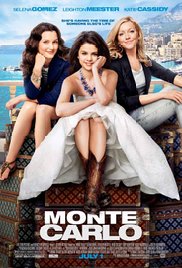
MONTE CARLO
US, 2011, 109 minutes, Colour.
Selena Gomez, Katie Cassidy, Leighton Meister, Cory Monteith, Luke Bracey, Andi Mc Dowell, Catherine Tate, Brett Cullen,Pierre Boulanger.
Directed by Thomas Bezucha.
Slipping into a holiday afternoon show at a multiplex, I found myself with the target audience (plus a few oldies and grandparents) and they all seemed to enjoy the shenanigans in Monte Carlo. The target audience is definitely teen girls (of all ages) with the characters being 18 and 21.
Apparently, this project started life as an adult romantic comedy for Nicole Kidman (whose name appears as one of the producers, as does Forest Whittaker) and Julia Roberts. It would have been the modern equivalent of those Golden Oldies like Three Coins in the Fountain, three women finding romance in a lovely European city, scenery and all. The powers that be reduced the ages of the three women and sent them to Paris. But, Paris was not enough and the plot soon takes them to Monte Carlo. There’s romance (all very PG level) and there’s beautiful scenery (and a clip from To Catch a Thief to honour Grace Kelly and all that romantic aura of Monaco half a century ago or more).
What gives the film more verve than might have been expected are the performances and the vivacity of the three actresses. Singer-actress Selena Gomez is Grace, an 18 year old from Texas who graduates and has been saving up for a trip to France (Andie Mac Dowell appears in a scene or two as her mother). There is her good friend, Emma, 21, a down-to-earth high school dropout who works at a diner (Katie Cassidy almost stealing the show with her bright screen presence) and Meg, 21, Grace’s new half-sister (Leighton Meester who has changed from snobby prim to letting her hair down).
After a nightmare rushed cheapo tour of Paris, Grace is mistaken for a British heiress, in France for a charity auction. She embodies all that film-makers caricature in creating an obnoxious (that’s an understatement!), snobbily domineering, self-centred upper class horror. It is to Selena Gomez’s credit that she makes Cordelia Winthrop Scott live up to this description. Catherine Tate portrays her aunt.
Yes, the plot then becomes a modern version of The Prince and the Pauper as Grace is bundled by mistake off to Monte Carlo, and the girls decide to live it up for a few days. Grace encounters a charming young Frenchman. Meg has already met an Australian backpacker in Paris who turns up in Monte Carlo (Luke Bray from Home and Away, looking like a blend of Heath Ledger and Simon Baker). Emma encounters a prince and finds that he is also a snob, especially when, being ignored at dinner with his friends all speaking French, she decides to help the waitresses with their clearing the tables. But she has a Texan beau who comes to France to find her.
The final expose of the three is fairytale enjoyable, aided by British comedian, Catherine Tate. The film’s heart is in the right place: down with the wealthy snobs, up with charity and volunteering – and true love.
Fluff, of course, but sparkling fluff.
1. A romantic comedy? Contemporary fairytale? Teenagers and young adults? The female audience?
2. Texas, homes, family, school, the restaurant? The musical score?
3. Paris and the scenery, Monte Carlo and locations? Echoes of Grace Kelly and To Catch a Thief?
4. Grace, at work, saving up, her mother? Owen and his proposal to Emma? Meg, half sister? Emma not responding to Alan, the three girls going for the holiday?
5. The trip to Paris, the guide leaving, going to a hotel, Grace being mistaken for Cordelia, her lookalike? The press following her, the reckless decision, standing in, staying in Paris, the auction, Cordelia’s luggage – and off to Monte Carlo?
6. Theo, Aunt Alicia, the Prince? The lavish party, dancing? The encounter with Riley, the Australian backpacker, their hitting it off?
7. In Monte Carlo, enjoying the holiday? The polo match, Aunt Alicia realising the truth from Grace’s riding style, the issue of the double, that it was perhaps Cordelia’s plan? The aunt’s concern about the auction, the necklace? The invitation to the party on the yacht, the necklace in the backpack and Riley leaving, returning?
8. Grace, dancing with the Prince, finding him arrogant, towards the staff?
9. Owen arriving, searching for Emma?
10. The real Cordelia, her arrival, the girls tying her up and gagging her? Grace going in her place, the option, everything going well, the aunt and the cash? Riley’s return with the necklace?
11. The real Cordelia escaping, denunciation of Grace, Grace breaking free?
12. Owen and Emma together, Meg and Riley going travelling, and Theo and Grace going to Romania for charity work?
13. 21st century fairytale?
Published in Movie Reviews
Published in
Movie Reviews
Tagged under